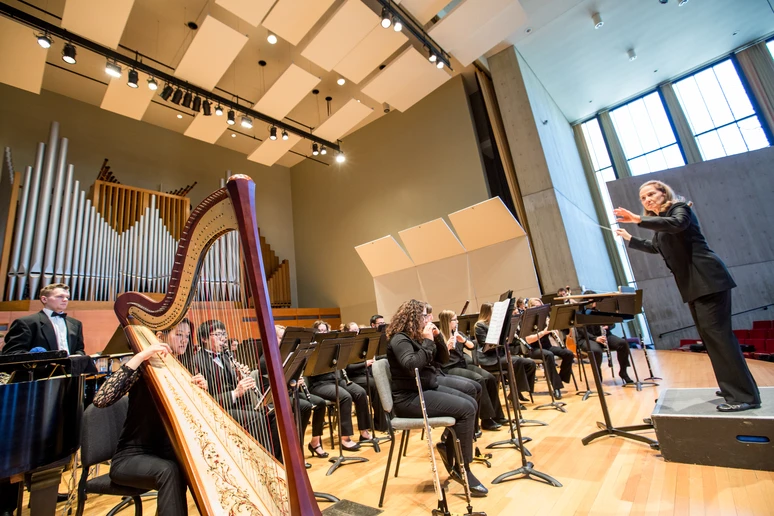

Accepted Students ONLY!
Join us Saturday, March 28 (10 AM–2 PM) for Go Big BLUE DAY — sessions, tours, and giveaways.
Sign Up Today!


If you or your student is passionate about music, you’ve likely asked the question: What can you do with a music degree? The answer may surprise you. At SUNY Fredonia’s School of Music—one of the best music schools in New York—music majors do more than study scales and scores; they develop career-ready skills that translate to a wide range of professions. With a 100% job placement rate for music educators and recognition as the second-largest producer of music teachers in the U.S., Fredonia proves that a music degree is both a calling and a smart investment in the future.
Absolutely! A music degree is more than a piece of paper—it's a passport to a world of professional opportunity, creative expression, and personal fulfillment. At SUNY Fredonia, our music graduates aren't just working—they're thriving in classrooms, studios, hospitals, and on stages around the globe. Whether you seek job security, artistic freedom, or a career that makes a difference, a music degree can get you there.
Music majors graduate with more than just talent. They bring a unique blend of discipline, creativity, technical know-how, and leadership to the workforce. Whether pursuing performance, education, therapy, production, or even roles outside of the arts, these graduates are equipped to succeed.
At SUNY Fredonia, students can choose from several focused paths within the music discipline—each one offering its own set of skills, experiences, and career outcomes:
Each of these branches allows students to tailor their music education to their goals, and to build a foundation for a career that matches their passion—whether it’s performing, teaching, healing, producing, or innovating in the music industry and beyond.
These transferable skills—like time management, collaboration, critical thinking, and communication—aren’t just useful in music; they’re essential in nearly every profession. Employers across industries value the adaptability and emotional intelligence that music majors bring to the table, making them competitive candidates far beyond the stage or classroom.
SUNY Fredonia’s School of Music stands out for its rigorous training, award-winning faculty, and real-world results. Students benefit from:
Plus, with some of the most affordable tuition rates in New York, Fredonia makes top-tier music education accessible and sustainable.
Whether you dream of performing on stage or managing behind the scenes, there’s a career for you. Music majors are thriving in roles across education, performance, therapy, technology, business, and beyond. With the diverse skill set developed through their training, graduates are not limited to traditional music jobs—they’re also excelling in areas like arts administration, digital media, event planning, and even data analysis. A music degree opens far more doors than most people realize, offering both creative fulfillment and professional versatility.
Technology and artificial intelligence are rapidly transforming the music industry, with the AI-powered music market projected to grow to $38.71 billion by 2033. While AI tools are becoming increasingly sophisticated at generating compositions, mixing tracks, and even correcting vocal pitch and allowing engineers to mix and master recordings much more quickly, the human element in music remains irreplaceable and more valuable than ever. AI technology is not yet able to capture the nuances of human creativity and emotion that define truly meaningful musical experiences. Musicians bring lived experiences, cultural understanding, emotional depth, and the ability to connect authentically with audiences—qualities that no algorithm can replicate. Rather than replacing musicians, AI's role in music creation will be transformative going forward, empowering musicians while challenging traditional workflows. The most successful music professionals will be those who learn to collaborate with AI as a creative tool while maintaining their uniquely human artistic vision, interpretation, and emotional intelligence. Your music education at Fredonia will prepare you not just to understand and use these emerging technologies, but to remain at the center of music-making as an irreplaceable human artist.
Just about anything! A music degree is more than a course of study—it’s a foundation for a meaningful, versatile career. Whether you envision yourself in a classroom, on a concert stage, in a therapy room, or managing tours, a degree in music opens the door.
At SUNY Fredonia’s School of Music, you’ll join a legacy of successful graduates who are shaping the world through sound, education, and innovation. If you're asking what major in music will prepare me for the real world—the answer is clear: one that gives you the skills, support, and experience to thrive. And Fredonia delivers.
Q: What can I do with a music degree besides perform or teach?
A: You can work in music production, therapy, arts administration, digital media, sound engineering, and even fields like marketing, education policy, and tech. Our graduates are proof that a music degree opens doors in both creative and corporate worlds.
Q: How do music majors find jobs after graduation?
A: With strong career support, alumni mentoring, and industry connections, our students graduate prepared—and in demand. Our 100% job placement rate for music educators is just one example.
Q: Can I double major or minor in another field while studying music at Fredonia?
A: Yes! Many of our students successfully double major or pursue minors in areas such as psychology, business, education, computer science, and communication. Fredonia encourages interdisciplinary learning, and our academic advisors work closely with students to ensure they can tailor their education to match their career goals and personal interests.
Q: What kind of hands-on experience will I get as a music major?
A: From your first year, you'll have access to real-world experiences that go beyond the classroom. Perform in ensembles, intern with arts organizations, record in professional studios, or collaborate on multimedia projects. Whether you’re conducting a choir, producing an EP, or working in a local school or healthcare facility, Fredonia’s programs emphasize practical experience that builds your résumé—and your confidence.
Learn more about Fredonia’s music programs and see how your future in music can hit all the right notes.